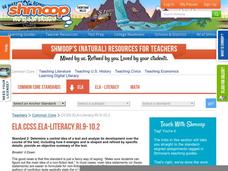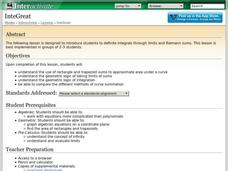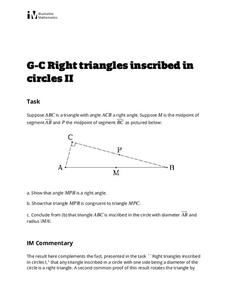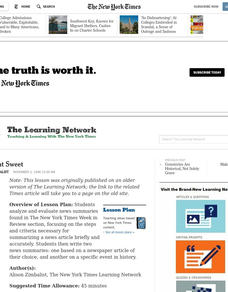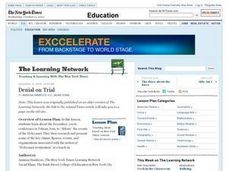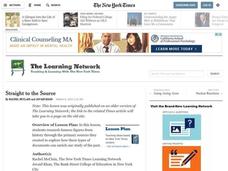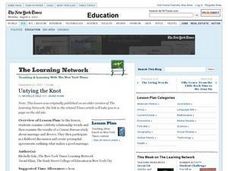Curated OER
Meaty Words
Headlines from newspapers launch a discussion of image-rich, meaty words. Just as headline writers choose vivid vocabulary to attract readers, young writers develop headlines that capture the essence of a passage from a book they are...
Curated OER
This is My Neighborhood
Students predict the things that they may see, smell, or hear in their neighborhood. They take part in a neighborhood walk, creating a rough map of their neighborhood as they go. Upon return to the classroom, students create a final map...
Schmoop
ELA.CCSS.ELA-Literacy.RI.9-10.2
Although the ideas on how to implement the skill RI.9-10.2 are lacking, the assessment would work well for challenging learners to summarize, and identify the main ideas of presidential speeches that are of similar topics. One could use...
Shodor Education Foundation
InteGreat
Hands-on investigation of Riemann sums becomes possible without intensive arithmetic gymnastics with this interactive lesson plan. Learners manipulate online graphing tools to develop and test theories about right, left, and midpoint...
Curated OER
What Can We Learn about India from a Ten Rupee Bank Note?
The class finds and cites evidence showing India's unity in diversity and work to recognize some of the complex interactions of a civilized community. They read to understand how geography, history, politics, economics, beliefs, and...
Illustrative Mathematics
How Thick Is a Soda Can II?
Science, technology, and math come together in this one combination exercise. Analyzing the common soda can from both a purely mathematical perspective and a scientific angle allows for a surprisingly sophisticated comparison of...
Illustrative Mathematics
Right Triangles Inscribed in Circles II
So many times the characteristics of triangles are presented as a vocabulary-type of lesson, but in this activity they are key to unraveling a proof. A unique attack on proving that an inscribed angle that subtends a diameter must be a...
Curated OER
Noteworthy?
Why do we have CliffsNotes? SparkNotes? Middle and high schoolers examine arguments for and against the recent influx of book notes, or study guides. They stage a debate in which they represent Advocates For or Critics Against the use of...
Curated OER
Short But Sweet
After analyzing and evaluating news summaries found in the New York Times "Week in Review" section, middle schoolers study the steps for summarizing a news article briefly and accurately. They write two news summaries: one on a newspaper...
Curated OER
Denial on Trial
What is the "Faurisson Affair”? What is “Holocaust Revisionism”? What does freedom of speech entail? Do revisionists have a right to voice their ideas? Such questions are at the heart of a richly detailed, thought provoking lesson plan...
Curated OER
Whose Rite Is It?
The class explores and debates, from multiple perspectives, a petition to allow Hopi Indians to take golden eagle hatchlings from a federal wildlife sanctuary for use in a religious ceremony. Pupils defend their personal views on the...
Curated OER
Diving into Iceland's Genetic Pool
Investigate ethical issues surrounding the Decode project in Iceland. Middle and high schoolers take the positions of the Icelandic government, scientific researchers, and citizens and defend or refute the Decode project in a Reykjavik...
Curated OER
Creature Seekers
Does it actually exist? Consider the sighting of a giant squid, much like the one that appears in 20,000 Leagues Under the Sea. Middle and high schoolers read the article One Legend Found, Many Still to Go, and research other mysterious...
Curated OER
Expressing Your Views to the Letter
Analyze the motivation, purpose, and value of letters to the editor by examining letters written in response to the violence at Columbine High School. For homework, middle and high schoolers write their own letters to the editor about an...
Curated OER
Straight to the Source
Research famous figures from history through the primary sources they created! Explore how these types of documents can enrich our study of the past with your middle and high school learners. They create picture books to illustrate...
Curated OER
Pig Products
How do you feel about cloning? This issue is highly debated, so educate your class before they participate in a similar debate! Read a New York Times article related to the use of cloned pig organs for human transplants. Groups develop...
Curated OER
College or Bust?
Based on a New York Times article, "The College Drop-Out Boom," participants in a fishbowl discussion formulate and express opinions about the correlation between level of education, career options, and economic mobility. Ample...
Curated OER
Untying the Knot
What are the current trends in divorce? What contributes to this? Examine celebrity relationship trends and how they relate to the general public with this discussion instructional activity. Middle schoolers analyze the results of a...
Curated OER
Laughing Matters
Is laughter really the best medicine? Middle and high schoolers discuss the truth behind this adage by reading and discussing a New York Times article about Dr. Patch Adams. They participate in a round-table debate in response to...
Curated OER
Rockefeller's Revenge: Exxon and Mobil Unite
Study the impact and possible outcomes of the Exxon-Mobil merger in your language arts, social studies, or economics class. Secondary learners evaluate a series of graphs, write a paragraph interpreting the data, and engage in class...
Curated OER
Loose Lips
Have your middle and high schoolers analyze instances of celebrities using racial slurs or making prejudiced comments in public. After reading an article, they consider the roots and effects of prejudice and bias. As a class, they...
Curated OER
Greed is Good?
From Mr. Merdle to Mr. Madoff? A viewing of the PBS adaptation of Charles Dickens’ “Little Dorrit” launches an examination of greedy characters in literature and a study of greed, unfairness, and economic hardship today. The richly...
Curated OER
Following the Leaders
Examine the historic election of Pope Benedict XVI and reflect on the challenges he faces as the new leader of the Catholic Church. This New York Times lesson investigates how other world leaders are chosen in different forms of...
Curated OER
The War of the Words
“Who’s This Guy Dylan Who’s Borrowing Lines From Henry Timrod?” The basic question in this lesson from the New York Time’s Learning Network is whether artists and authors who use the words of others are stealing from that artist or...




